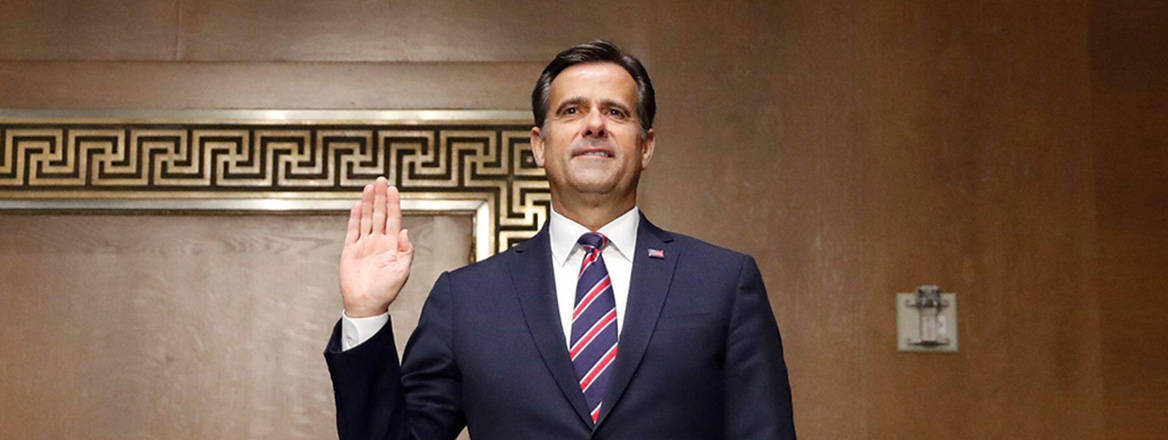After the turmoil of his first administration, Donald Trump’s new nominations for the top roles in US espionage will spark fresh concern within the intelligence community and among Washington’s closest allies.
Few presidents have had such troubled relations with the US intelligence community (IC) as Donald Trump. His first administration was peppered with fiery tweets, stinging op-eds, and a very public fiasco in Helsinki, where he appeared to side with Vladimir Putin against his own intelligence analysts. Returning to the White House in 2025, Trump 2.0 promises a renewed age of discord and dysfunction; and it has perhaps already begun with his nominations for Director of the CIA (D/CIA) and Director of National Intelligence (DNI).
The announcement that John Ratcliffe had been tapped for Langley’s top job was mildly alarming. Though he has had some previous experience in the IC, Ratcliffe spent much of that time focused on attacking the Democratic Party. Nevertheless, any concern about his nomination was quickly overshadowed by the news that the president-elect had chosen Tulsi Gabbard – an IC neophyte and notorious advocate of Russian disinformation – for DNI. With a vengeful Trump at the helm once again, both of these nominations will present difficult challenges to US intelligence at a crucial moment in its history.
New Arrivals
Apprehension had been growing for some time over the changes Trump would bring to the IC should he return to the Oval Office. After President Joe Biden managed placid and effective relations with the US’s spies, many were worried about Trump’s plans for retribution and the damage he could inflict. Talk of installing unqualified sycophants such as Kash Patel into senior roles and politicising intelligence at unprecedented levels was rife. His first moves have done little to quell this unease.
Trump will relish subordinating the intelligence community, making it a powerful institution aligned to his worldview and ensuring it only provides reports he wishes to hear
Ratcliffe previously served as DNI in the first Trump administration and on the House Intelligence Committee during his time in Congress. While this makes him a somewhat more conventional pick for D/CIA compared to others in Trump’s circle, the quality of his experience should not be overstated. He only served as DNI for eight months, much of which was spent fixated on Hilary Clinton’s 2016 presidential campaign. Despite CIA objections, Ratcliffe was determined to declassify reports which he believed proved that Russian meddling in the election was a hoax, and he was also eager to please Republican Senators when they requested intelligence to suit their narratives.
Gabbard’s past is an even greater cause of anxiety. Since she entered the House as a Democrat in 2013, Gabbard has called for isolationist foreign policies using information widely viewed as replicating Kremlin narratives. Blaming NATO for Russian aggression against Kyiv, she has also parroted claims that the US funds bioweapon laboratories in Ukraine. Beyond Russia, she has shown sympathies with Bashar al-Assad – meeting with the Syrian president in 2017 – and has argued for the appeasement of Nicolás Maduro in Venezuela. Coupled with the fact that she has never served in the IC, this makes Gabbard a disturbing choice for DNI.
Trump’s selection of Ratcliffe and Gabbard has less to do with their apparent credentials and more to do with his belief that he can ‘rein in’ the US’s intelligence agencies through sympathetic Directors. Neither of his nominees are likely to uphold the IC’s belief in speaking truth to power and keeping a distance from policymaking, ideals deeply held since the Cold War. Believing it to be nothing more than a component of the ‘deep state’ determined to undermine his presidency, Trump will relish subordinating the IC, making it a powerful institution aligned to his worldview and ensuring it only provides reports he wishes to hear.
New Challenges?
Trump is of course not the only president to have a turbulent relationship with the IC, and nor is he the first to nominate a loyalist to a top espionage role. Others – such as Lyndon Johnson, Richard Nixon and Jimmy Carter – have previously placed unsuitable political allies into senior IC positions. Yet the history of US intelligence-policy relations should serve as a warning about the consequences of intense politicisation. Johnson and Nixon’s picks for Director of Central Intelligence had particularly brief and tumultuous directorships which harmed the morale, efficacy and reputation of the IC. And when it comes to demanding intelligence to suit premade policy ideas, one only has to look at the twin disasters in Vietnam and Iraq.
NATO members may well be hesitant about sharing intelligence on Russia with a DNI known for holding questionable ties to foreign adversaries or a D/CIA who will focus on doing Trump’s political bidding
Should Gabbard and Ratcliffe assume their roles, we can expect similar issues to arise. The IC will be brought under the control of the executive branch like never before. There may be further attempts to declassify intelligence harmful to the Democrats, politicisation of reports to support the White House’s policies, or alerts being left ignored in order to not upset the president. Some senior officials may resign in protest or become vocal critics of the president, as has happened previously. All of this will harm the legitimacy and already eroding reputation of the IC.
The implications will also extend beyond the US itself. After Trump took classified material back to his Mar-a-Lago resort, Washington’s allies and partners are already cautious about sharing intelligence with the incoming president, and the new Directors will only further exacerbate this. NATO members may well be hesitant about sharing intelligence on Russia with a DNI known for holding questionable ties to foreign adversaries or a D/CIA who will focus on doing Trump’s political bidding.
Whether either of these nominations manage to clear their Senate confirmations is uncertain. Ratcliffe previously had his nomination for DNI withdrawn after numerous Senators expressed concern about his inexperience and partisan behaviour in 2019, though he was later confirmed by small margin in 2020. Gabbard is expected to face stiffer questioning, with lawmakers in both parties worrying about the risks she would bring to national security. However, with a Republican-controlled Senate, both nominees do have a substantial chance of being confirmed. Either way, stormy times lie ahead for US national security.
© Ronan Mainprize, 2024, published by RUSI with permission of the author
The views expressed in this Commentary are the author’s, and do not represent those of RUSI or any other institution.
For terms of use, see Website Ts&Cs of Use.
Have an idea for a Commentary you’d like to write for us? Send a short pitch to commentaries@rusi.org and we’ll get back to you if it fits into our research interests. Full guidelines for contributors can be found here.
WRITTEN BY
Dr Ronan Mainprize
- Jim McLeanMedia Relations Manager+44 (0)7917 373 069JimMc@rusi.org



